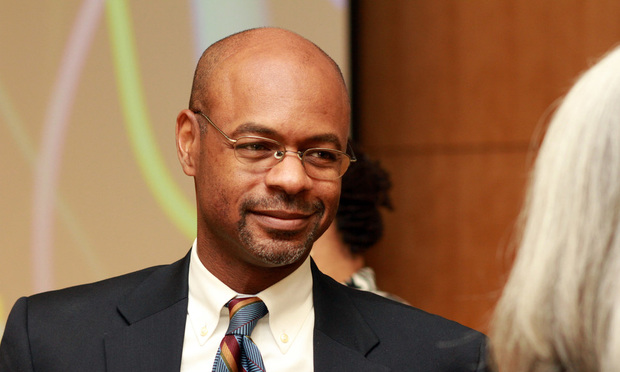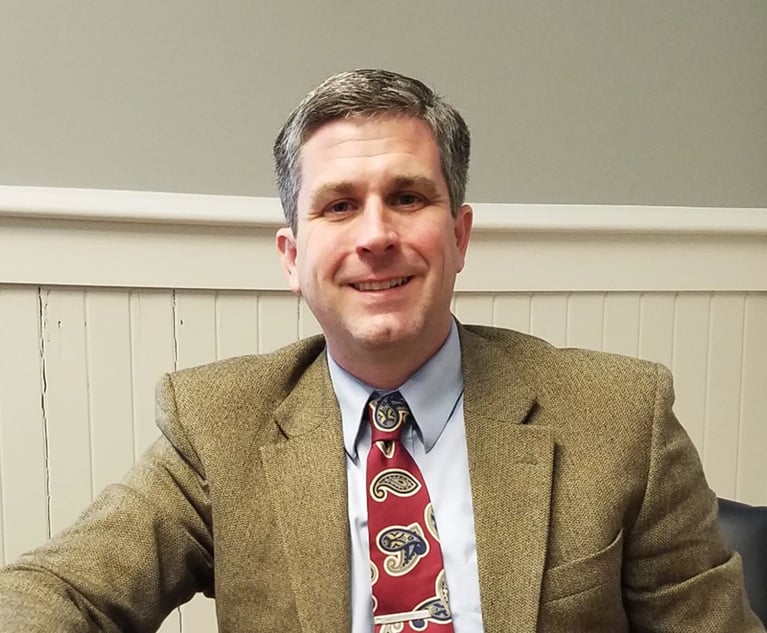Chief Justice, Highlighting Role of Language Interpreters, Calls for 'Justice for All'
“We have to get justice for all,” Chief Justice Harold Melton said. “And the people have to feel like they've gotten justice. They have to know it so they can have confidence in the system.”
October 31, 2018 at 08:15 PM
4 minute read
 Georgia Chief Justice Harold Melton talks to attendees at the 2018 Eliminating Barriers to Justice Conference. He was the keynote speaker at the event. (Photo: John Disney/ALM)
Georgia Chief Justice Harold Melton talks to attendees at the 2018 Eliminating Barriers to Justice Conference. He was the keynote speaker at the event. (Photo: John Disney/ALM)
Georgia Supreme Court Chief Justice Harold Melton told those gathered for the Eliminating Barriers to Justice conference at Georgia State University College of Law Wednesday that the state has made dramatic progress in providing courtroom interpreters, but needs to do more.
“We have to get justice for all,” Melton said. “And the people have to feel like they've gotten justice. They have to know it so they can have confidence in the system.”
Melton encouraged the gathering of lawyers, judges and administrators to foster ideas for improvement in making sure criminal defendants and civil litigants can speak the same language with others in the courtroom. “This is a critical issue,” Melton said.
The fifth “Eliminating Barriers to Justice” conference broadened beyond language translation to helping those with disabilities, including the deaf and hard of hearing.
Last year's conference focused on legal aid options in the rural Georgia counties that have few or no lawyers, as well as providing qualified language interpreters for all court proceedings. Jana Edmondson-Cooper, a member of the Supreme Court of Georgia Commission on Interpreters, co-created the series with Lisa Krisher, director of litigation at Georgia Legal Services Program, and A. Bernadette Olmos, managing partner at A.B. Olmos & Associates.
Melton noted progress made since the Supreme Court started the commission in 2003 to oversee the development of a statewide plan for the use of interpreters in Georgia courts.
“I remember what it was like,” Melton said. Judges would ask, “Who do we have in the courthouse who speaks Korean or Mandarin?”—or whatever was needed—and then say, “Go get him.”
And if an interpreter was located, the quality of the translation might leave much to be desired, Melton said.
He told a fictional story to make the point. A sheriff asks a robbery suspect, “Where is the money?” The suspect answers, “I don't know” in Spanish. The deputy translates. The sheriff threatens to shoot the suspect if he doesn't give up the cash. He answers in Spanish, which Melton spoke flawlessly, that the money is two blocks to the right under the tree. The deputy translates: “He said he wants to die with dignity.”
Now the state has uniform procedures for providing trained and qualified interpreters in all courts, thanks to the work of the commission, Melton said.
The commission is composed of judges, lawyers, nonlawyers, legislators, court administrators and interpreters and charged with regulating a statewide comprehensive court interpreter program, developing the criteria for the training and certification of interpreters, designating languages for which certification shall be required and establishing standards of conduct for interpreters.
One of the responsibilities of the commission is to provide access to competent professional interpreters to ensure understanding and participation for all non-English-speaking persons involved in the court process. The commission provides an online registry of licensed interpreters, which assists the public and members of the bench and bar in locating qualified court interpreters throughout the state. The group meets quarterly to consider ways to improve language access resources in Georgia's courts.
Melton is a former chair of the commission, a job now held by Justice Keith Blackwell. Melton said the most dramatic year for the progress of courtroom interpreting services was 2010, when the U.S. Department of Justice sent a letter to every state demanding it. He recalled going to a national conference of judges and learning that Georgia had already made more progress than some states.
“Tension always exists,” Melton said, in balancing the need for interpreters in every courtroom with the demand for training and qualifications before they are allowed to work.
“But the bottom line is we can't throw up our hands,” Melton said. “We have to continue to press forward.”
This content has been archived. It is available through our partners, LexisNexis® and Bloomberg Law.
To view this content, please continue to their sites.
Not a Lexis Subscriber?
Subscribe Now
Not a Bloomberg Law Subscriber?
Subscribe Now
NOT FOR REPRINT
© 2025 ALM Global, LLC, All Rights Reserved. Request academic re-use from www.copyright.com. All other uses, submit a request to [email protected]. For more information visit Asset & Logo Licensing.
You Might Like
View All

Justice 'Weaponization Working Group' Will Examine Officials Who Investigated Trump, US AG Bondi Says


Georgia Justices Urged to Revive Malpractice Suit Against Retired Barnes & Thornburg Atty
4 minute readTrending Stories
Who Got The Work
J. Brugh Lower of Gibbons has entered an appearance for industrial equipment supplier Devco Corporation in a pending trademark infringement lawsuit. The suit, accusing the defendant of selling knock-off Graco products, was filed Dec. 18 in New Jersey District Court by Rivkin Radler on behalf of Graco Inc. and Graco Minnesota. The case, assigned to U.S. District Judge Zahid N. Quraishi, is 3:24-cv-11294, Graco Inc. et al v. Devco Corporation.
Who Got The Work
Rebecca Maller-Stein and Kent A. Yalowitz of Arnold & Porter Kaye Scholer have entered their appearances for Hanaco Venture Capital and its executives, Lior Prosor and David Frankel, in a pending securities lawsuit. The action, filed on Dec. 24 in New York Southern District Court by Zell, Aron & Co. on behalf of Goldeneye Advisors, accuses the defendants of negligently and fraudulently managing the plaintiff's $1 million investment. The case, assigned to U.S. District Judge Vernon S. Broderick, is 1:24-cv-09918, Goldeneye Advisors, LLC v. Hanaco Venture Capital, Ltd. et al.
Who Got The Work
Attorneys from A&O Shearman has stepped in as defense counsel for Toronto-Dominion Bank and other defendants in a pending securities class action. The suit, filed Dec. 11 in New York Southern District Court by Bleichmar Fonti & Auld, accuses the defendants of concealing the bank's 'pervasive' deficiencies in regards to its compliance with the Bank Secrecy Act and the quality of its anti-money laundering controls. The case, assigned to U.S. District Judge Arun Subramanian, is 1:24-cv-09445, Gonzalez v. The Toronto-Dominion Bank et al.
Who Got The Work
Crown Castle International, a Pennsylvania company providing shared communications infrastructure, has turned to Luke D. Wolf of Gordon Rees Scully Mansukhani to fend off a pending breach-of-contract lawsuit. The court action, filed Nov. 25 in Michigan Eastern District Court by Hooper Hathaway PC on behalf of The Town Residences LLC, accuses Crown Castle of failing to transfer approximately $30,000 in utility payments from T-Mobile in breach of a roof-top lease and assignment agreement. The case, assigned to U.S. District Judge Susan K. Declercq, is 2:24-cv-13131, The Town Residences LLC v. T-Mobile US, Inc. et al.
Who Got The Work
Wilfred P. Coronato and Daniel M. Schwartz of McCarter & English have stepped in as defense counsel to Electrolux Home Products Inc. in a pending product liability lawsuit. The court action, filed Nov. 26 in New York Eastern District Court by Poulos Lopiccolo PC and Nagel Rice LLP on behalf of David Stern, alleges that the defendant's refrigerators’ drawers and shelving repeatedly break and fall apart within months after purchase. The case, assigned to U.S. District Judge Joan M. Azrack, is 2:24-cv-08204, Stern v. Electrolux Home Products, Inc.
Featured Firms
Law Offices of Gary Martin Hays & Associates, P.C.
(470) 294-1674
Law Offices of Mark E. Salomone
(857) 444-6468
Smith & Hassler
(713) 739-1250






